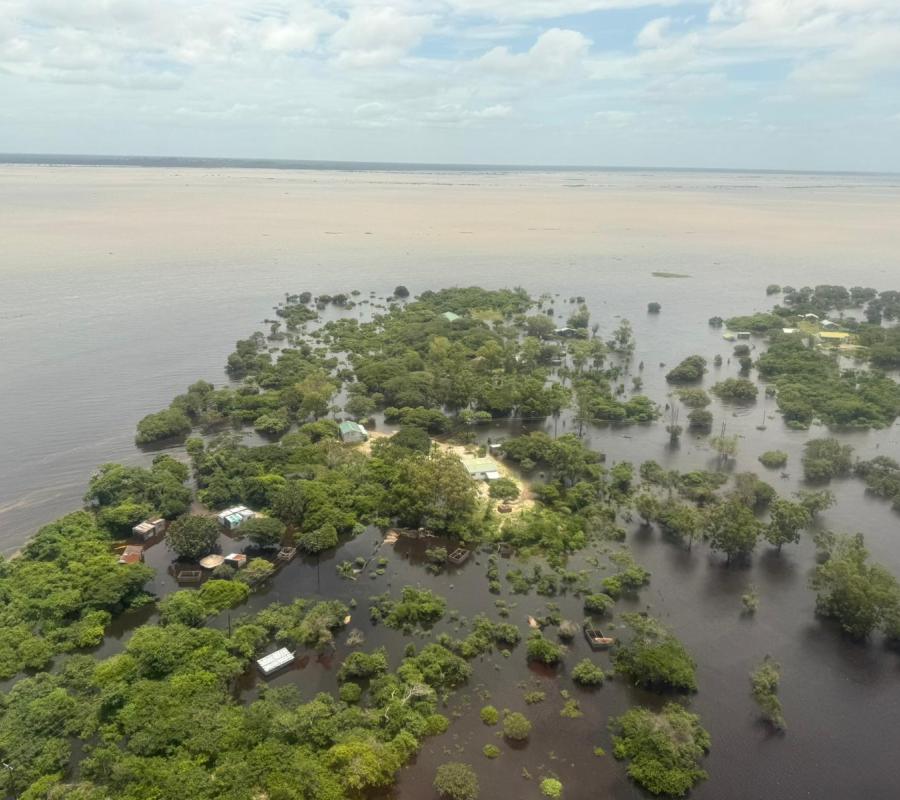Prevention, Protection And Education
Flooding
LFRS has already made significant improvements in how we work with partners and use modelling information to inform our prevention activities. This includes working alongside partners such as the Environment Agency, Met Office, and utility providers in the Lancashire Resilience Forum (LRF) and utilising specialist weather-based applications such as ‘Hazard Manager’ to support pre-planning and forecasting information.
The Environment Agency co-ordinate the national flood alerting system and send alerts direct into LFRS officers.
Following a level 1 notification LFRS representatives may consider utilising software applications to monitor water/river levels.
Upon receipt of a level 2 or 3 notification, representatives from the Environment Agency can request LFRS dial into a flood advisory service call where response arrangements may be agreed.
This means that flooding is possible, be prepared. It is used two hours to two days in advance of flooding.
This means that flood is expected, and immediate action is required. It is used half an hour to one day in advance
This means that there is severe flooding and a danger to life. It is used when flooding poses a significant risk to life or significant disruption to communities.
In some high-risk areas in Lancashire our staff are embedded within community flood action groups. This encourages positive community engagement and supports the ability to communicate our prevention strategies.
We also engage with partners such as United Utilities to install water safety notice boards fitted with a life ring and throw rope; these can be a critical resource at known risk sites.
As the risk of fire significantly increases during flooding events; our fire protection teams now utilise flood risk as part of the risk-based approach to delivering our fire safety inspection programme.
Our Aspirations
Over the course of this Climate Change Operational Response Plan, we intend to reduce the number, scale, and impact of flooding events by:
Exploring the establishment of a Lancashire water safety partnership
Continuing to work within the Lancashire Resilience Forum framework and with other key partners to reduce the risk to life and property arising from flooding events
Implement an effective education and communication strategy to engage and educate communities and partners regarding flooding prevention and water safety. This will consider local, national, and international best practice in relation to flooding and water safety
Working with communities and partners to support proactive measures during times of heightened weather alerts and warnings
Considering the role played by our business safety advisors in providing additional business continuity advice in known locations of flood risk
Delivering targeted home fire safety checks in domestic premises in known flood risk areas
Further embedding staff within community flood action groups
Wildfire
Although these incidents can start naturally, the majority are caused either accidentally or deliberately by people. Increasing leisure activity on open access land, in conjunction with societal trends such as careless use of disposable barbecues and campfires, has only escalated these risks.
LFRS regularly work alongside partners from the Lancashire Fire Operations Group (LFOG) to prevent wildfires from occurring and provide safety advice to representatives of our local communities in preventing the ignition of wildfires and mitigating the effects of them if they do occur.
Annual wildfire prevention campaigns are delivered to local communities and the wider public across a variety of physical and social media platforms.
LFOG members and landowners such as United Utilities along with Lancashire Constabulary have actively contributed to the production and delivery of such media material.
LFRS staff also currently deliver prevention education in secondary schools using partner resources and our own teensafe wildfires module.
LFRS works closely with LFOG members and local volunteer groups such as Darwen Moorwatch who patrol predetermined risk areas during times of high risk. These volunteers offer wildfire safety advice to members of the public.
Should an incident occur they also provide early notification to North West Fire Control (NWFC) thus enabling LFRS to deploy a rapid response thereby preventing fire spread.
Our Aspirations
It is acknowledged that our staff already undertake a range of successful activities in relation to wildfire prevention.
These will be strengthened by:
Working with Lancashire Constabulary Rural Task Force to investigate the cause of wildfires and prosecute those responsible for deliberate fire setting and illegal off-road activities
Supporting partners to implement the use and enforcement of public space protection orders banning the use of barbecues and campfires and restricting access to areas at high risk of wildfires
Considering the creation of wildfire toolkits enabling LFRS staff and resources to support partnership prevention through activities such as prescribed burning and flail cutting for landowners / managers as per the South Wales FRS model.
Working with landowners and Natural England for effective application of the burn code
Working with public and key partners to change legislation and/or influence societal trends. This could include the development of a land use framework used to inform decisions on how land is used, managed, and protected
Raising public awareness of wildfire safety
Supporting the development and implementation of a UK fire danger rating system
Working with local authorities to create designated barbecue areas in country parks
Implementing an effective intelligence led education and communication strategy to engage and educate communities regarding wildfire prevention such as the national firewise campaign
Considering the role played by business safety advisors in providing additional business continuity advice in known locations of wildfire risk
Delivering targeted home fire safety checks in domestic premises in known wildfire risk areas
Working with volunteer groups to expand prevention activities such as Darwen Moorwatch into other identified risk sites
Emergency Planning
Flooding
The Lancashire Resilience Forum (LRF) has a specific flooding group that brings together stakeholders from across all sectors and ensures that the various agencies have effective, co-ordinated plans in place to prepare and respond to incidents of this type.
These plans are merged to form the LRF multi-agency flood plans, part 1 and 2 which are available on the shared platform, Resilience Direct.
Testing and exercising plans is key to the effectiveness of the response, with recommendations and improvements driven at all levels to ensure matters relating to planning and response arrangements are robust.
The Environment Agency has installed telemetry devices at several locations throughout Lancashire where rivers are prone to flooding and data from these is used to provide an immediate flood warning to Category 1 responders.
LFRS appliances have Mobile Data Terminals (MDT’s) which record and store rapid response catchment area flood plans for these river locations. On receipt of a flood warning in a rapid response catchment area, NWFC automatically mobilise the nearest fire appliance.
The incident commander follows the instructions on the flood plan to enable a multi-agency response to be instigated. This early notification provides LFRS with valuable time to prepare prior to a flood related incident occurring.
Loss of power during severe flooding events significantly increases fire risk within a commercial environment, therefore LFRS protection staff review the flood risk as part of the risk-based inspection programme during fire safety inspections.
Our Aspirations
During this plan, we will:
Undertake operational risk assessments which will support the creation of tactical plans for known high risk locations
Review the advice and signposting capability provided by business safety advisors when conducting protection activity in recognised flood risk areas
Review the targeting and prioritisation of home fire safety checks in relation to the increased risk experienced by households in recognised flood risk areas
Wildfire
To support the national approach, our lead wildfire tactical advisors attend the England and Wales Wildfire Forum and the National Wildfire Conference along with supporting implementation of the Natural Hazard Partnership and Fire Severity Index (fire danger rating system).
This allows LFRS to identify the potential for significant wildfire events and prepare its wildfire units and staff for deployment.
The Daily Hazard Assessment (DHA) allows LFRS to determine the likelihood of a significant event and carry out preventative measures and increase our presence in known wildfire locations, this includes the use of volunteer groups undertaking firewatch activities between significant hours and informing people of the risk during community engagement events.
Locally our managers (supported by wildfire tactical advisors) are embedded within many groups which enable a pre-planned and co-ordinated response to incidents.
This work includes chairing the Lancashire Fire Operations Group (LFOG), supporting the South Pennine Fire Operations Group (SPFOG) and Cumbria Fire Operations Group (CFOG) whilst engaging and supporting partners from United Utilities, Mountain Rescue, volunteer groups (Darwen Moorwatch), local authorities (Emergency Planning) and the Lancashire Constabulary Rural Task Force.
LFRS always has a nominated Command Support Officer on duty who receives notification from the Met Office of potential severe weather events.
These officers liaise with partner agencies to understand the scope, potential impacts and operational requirements that may be required to effectively deal with an ongoing situation. This usually involves the standing up of our Command Support Room where activities are co-ordinated from.
LFRS continues to utilise a range of websites and application’s including Natural Hazards Partnership, Met Office, Sentinel Hub, and the Fire Information for Resource Management System (FIRMS) for early warning notification and forecasting.
Through Resilience Direct (RD), LFRS has access to the National Asset Register and the LFOG asset list, from which we can draw upon vehicles and equipment from partners, landowners, and external contractors.
Our Aspirations
During the term of this plan, we will:
Review our reporting/monitoring processes to demonstrate the impact of weather-related incidents
Undertake operational risk assessments which will support the creation of tactical plans for known high risk locations
Continue to invest in technology to support preplanning activities
Training
LFRS seek to deliver the highest standards of operational response by continuously planning and preparing, including internal and external training exercises for emergencies, so that we are best able to respond efficiently and effectively to any flooding or wildfire incident.
Flooding
LFRS personnel are trained to the following competencies:
Level 1 – Floodsuit responder (FR)
Completed by staff at all stations except Swift Water Rescue (SRT) and boat locations. Floodsuit responder is our equivalent of the basic national standard Water and Flood Awareness qualification.
Level 2 – Swiftwater and flood first responder (SFR)
This qualification permits our high volume pump crews to work safely in and near water no deeper than their waist. They are only taught swimming techniques for the purpose of self-rescue.
Level 3 – Swiftwater and flood rescue technician (SRT)
We currently have SRT trained staff geographically distributed at strategic locations across the county.
Level 4 – Swiftwater and flood rescue boat operator (SFRBO)
Staff at strategic locations are trained to SFRBO which allows them to safety deploy and operate the rescue boats that we have in county. As a prerequisite, these staff also receive SRT training, although they are not utilised for standard SRT operations.
Level 5 – Flood water incident management (FWIM)
Operational middle managers undertake this training to support operational activity in a rescue and flooding environment.
Level 6 – Flood water incident manager tactical advisor
These subject matter advisors can be requested to support a complex incident via National Resilience.
Lancashire has recently hosted a DEFRA assurance visit that assessed our assets against the DEFRA Concept of Operations released in late 2019.
The visit confirmed that LFRS aligns firmly with the requirement of DEFRA standards.
Our Aspirations
It is our intention to maintain existing skillsets and with this in mind we will:
Train a further cohort of level 5 Flood Water Incident Managers (FWIM’s).
Develop several officers presently qualified to FWIM standard, to level 6 Flood Water Tactical Advisors, for use in county or as part of National Resilience arrangements.
Wildfire
The current wildfire response identifies the levels of wildfire training in LFRS from ‘Wildfire awareness’ to ‘Wildfire Burn Supervisor’.
Level 1 – Wildfire awareness training
Level 2 – Wildfire teams
An initial course for new personnel
Skills maintained through local training and exercises
E-learning training package
Level 3 – Wildfire manager (internal tactical advisors)
An initial wildfire managers course
Skills maintained through local training and exercises
Attend a refresher course
Level 4 – Advanced wildfire manager/National Fire Chiefs Council (NFCC) wildfire tactical adviser
An advanced wildfire managers course
Maintain skills through training, exercises, and national forums
Attend annual wildfire tactical advisor conference / course
Burn team
An initial burn supervisor course
Skills maintained skills through training and exercises
Annual development requirement
Three yearly international training
Our provision and distribution of these specialisms will be reviewed on an ongoing basis aligned to any change in risk in Lancashire.
Engagement with the NFCC Wildfire forum will ensure that there is effective liaison and exchange of information between the England and Wales Wildfire Forum (EWWF), Scottish Wildfire Forum (SWF) and other relevant organisations and agencies to maintain appropriate situational awareness.
Our Aspirations
During this plan, we will:
Review the disposition of specialist wildfire officers and tactical advisors, specialist skill sets such as burn team capability, and our off-road driving capabilities
Consider enhancements in training which may arise because of international/global changes in wildfire firefighting techniques
Operational Response
We presently utilise a range of fleet assets to deliver our operational response to flooding and wildfire incidents.
As part of our Emergency Cover Review, and this response plan, we commit to keep under constant review, the suitability, size, and distribution of such assets aligned to risk in Lancashire.
Furthermore, we will monitor technological developments to identify possible improvements in firefighting capabilities which could further strengthen our response arrangements.
Flooding
Our present flooding assets include:
Fire engines with a pumping capability of 2000 litres per minute (lpm). All crew-members (other than SRT crews) are issued with flood suits and life jackets which permit crews to wade up to waist deep in still water (figure 2)
Water Tower (Stinger) appliances with a pumping capability of 5000 lpm (figure 3)
A high volume pump which is a National Resilience asset with an output of 7000 lpm (figure 4), deployed with the hose box which can deliver up to 3km hose for an incident
Water rescue pump units located at SRT stations. These appliances carry a variety of equipment including dry suits, helmets, floating lines, and rescue sleds (figure 5).
Rescue boats (figure 6)
Rescue rafts (figure 7)
Flood water incident managers
Access to externally provided assets to support flooding response
Specialist national support via National Resilience arrangements
Our Aspirations
Over the duration of the CCORP we intend to:
Review the suitability, number, and disposition of flood resources in line with the Emergency Cover Review and Special Appliance Review. This will include enhancing our transportation and off-road capabilities, to support improved operational response to flooding incidents in rural locations
Purchase two Hagglund off-road vehicles for use in flooding incidents or wildfire environments (figure 8)
Develop our incident command and Command Support Room capability through evaluating the use of new technology, body worn cameras and personal tracking devices as per mountain rescue to improve situational awareness and health and safety of staff
Evaluate the provision of evacuation sleds
Wildfire
We presently maintain a range of fleet vehicles dedicated to wildfire response; these include:
All front-line fire appliances are equipped with a selection of small tools, beaters, aqua leader water packs
Hagglund tracked vehicles provided by third party organisations transported to incidents by a beavertail flatbed transporter (figure 9)
Polaris (figure 10), a six-wheeled vehicle with 250 litre water tank and high-pressure fogging system
Wildfire support 4×4 (figure 11) carrying various pieces of wildfire equipment including blowers, small pumps, and other ancillary equipment
Water bowser (figure 12) with 9000 litre water capacity, which will supply vast amounts of water to remote and hard to reach areas or areas with low water flow
Burn team comprising staff trained to undertake controlled burns as part of our suite of tactical options to deal with wildfires
Internal wildfire tactical advisors
National wildfire tactical advisors (WFTA)
Access to externally provided assets to support wildfire response
Our Aspirations
We aim to further develop our wildfire operational response by:
Working with communities and partners to support joint operational response to incidents
Considering development of our burn team capability across other areas of the county
Reviewing the provision of LFRS assets to ensure that our 4×4 vehicles remain amongst the most versatile and reliable during wildfire conditions
Review our existing wildfire team resources with a view to developing a flail / cutting capability. This will enable us to manage fuel loading, without the impact from controlled burning in locations where Natural England have designated SSSi and deep peat sites
Working with neighbouring FRSs, partners, researchers and manufacturers, utilising advancements in technology and equipment to develop enhanced solutions incidents
Taking the opportunity to learn from local, regional, and national response and best practice
Personal Protective Equipment (PPE)
As a Service which seeks to continually learn and improve from our experiences, we actively debrief incidents attended to identify opportunities for improvement to practices and Personal protective equipment.
Flooding
All operational staff are equipped to operate as part of an initial crew responding to floods. This includes the provision of flood suits, life jackets and throw lines for all first responders.
Swift water rescue (SRT) crews have dry suits, safety footwear and helmets issued.
High volume pump crews (HVP) are issued flood suits and a selection of drysuits with integral boots and floatation devices as worn by SRT crews for use during National deployments.
Our Aspirations
We will continue to utilise incident debriefing along with regional and national learning to review the provision of personal protective equipment for staff at flooding incidents.
National guidance regarding the use of personal floatation devices for evacuees during flooding is currently being updated; we intend to evaluate a suitable provision for this purpose.
Wildfire
Following feedback from previous incidents and exercises, we have recently issued all operational staff with Altberg safety boots which provide enhanced ankle support over rough terrain and can be worn at a variety of incidents.
We have also made good progress with the first phase of our PPE improvement ambitions, by providing dedicated wildfire PPE to members of our burn team along with the Hagglund operators.
Our Aspirations
We aim to broaden the rollout of specialist wildfire PPE, underpinning our aspirations to protect the health, safety, and wellbeing of firefighters against smoke, radiated heat and climatic heat exposure when operating at wildfire incidents.
Welfare
Welfare of our staff is of primary significance particularly when operating over protracted periods in arduous conditions.
Basic needs provided by LFRS include provisions such as water bottles, sun hats, creams, and insect repellents which are readily available for all staff attending flooding and wildfire incidents along with extended deployment bags for those deployed out of county.
For protracted incidents we can deliver welfare arrangements at scene via external contractors and volunteers from the Salvation Army.
In recent years, LFRS have made considerable advances, including the implementation of a dedicated welfare / rest unit and use of generators, powered cool boxes, individual food ration packs and shelters.
These resources allow for a forward control/welfare point to be established at an easily accessible location on the fireground.
Our Aspirations
Over the course of this Climate Change Operational Response Plan, we aim to constantly review and improve these facilities based upon our operational learning from incidents and advancements locally, regionally, and nationally across the fire and rescue service sector.




